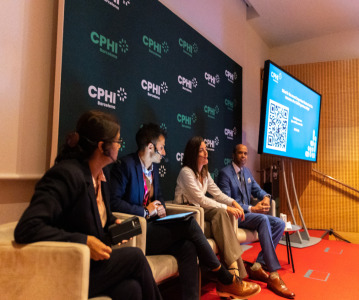CPHI Worldwide Experts Make Pharma Predictions for 2015: The Good, the Bad and the Ugly

CPHI Worldwide, organised by UBM EMEA, has delivered its expert panel forecast for the pharmaceutical industry in 2015. Panel members Prabir Basu, Consultant at Pharma Manufacturing; Hendrik Baumann, CEO of Arevipharma GmbH; Brian Carlin, Director, Open Innovation, FMC; Emil W. Ciurczak, President Doramaxx Consulting; Girish Malhotra, President EPCOT International; Hedley Rees, Managing Consultant at PharmaFlow; and Dilip Shah, CEO, Vision Consulting Group, have all predicted trends for the year ahead.
The biggest talking point amongst the industry experts, and members of the panel, was how the consistent growth in Big Pharma’s implementation of continuous manufacturing and QbD over the next 12 months will unfold. For example, IFPAC (International Forum on Process Analytical Chemistry) are holding several sessions this year to encourage an increased use of generic PAT/QbD and a new Office of Pharmaceutical Quality, as launched by the FDA, will also encourage an increased QbD adoption throughout the industry. Beyond this, industry and the FDA will continue to emphasise Quality Metrics, but nothing substantial is expected. Indian pharmaceutical companies are, according to Prabir Basu, also showing significant interest in implementing OPEX-which could be a significant cultural shift.
Dilip Shah predicts an evolution in the FDA’s role to become more of an 'enabler' of better quality processes — rather than just an ‘investigator’ — helping the industry to adapt and implement new approaches. Emil W. Ciurczak goes further and believes that in 2015 we will also see the CDMO market actively implementing QbD and PAT as a source of competitive edge.
Another positive advancement is anticipated across infectious disease treatments. Hendrik Baumann forecasts a major breakthrough for HIV, Hepatitis C or Malaria, and he also predicts solid growth for NCEs (new chemical entities) and within the biopharmaceuticals market.
Not all aspects of pharma supply are facing a positive outlook in 2015. Marginal pressures caused by a greater profit driven approach to sourcing and consequential reduced stockpiling by pharmaceutical producers and wholesalers will have a major effect on Western drug markets, with popular drugs in danger of falling short of demand warns Baumann. The production of popular medicines will be less appealing to companies who will decrease warehouse capacities and stockpiling to cope with increasing marginal pressures.
Moreover, Girish Malhotra has called for action on QbD, continuous manufacturing and PAT to finally take hold across the pharmaceutical industry. He did stress, however, that although continuous processing is ideal for finished formulations, new solutions are needed for API. This is where his concerns are greatest and despite a lot of talk about positive change, not enough progress will be implemented in 2015. Both Girish and Prabir Basu warn that outsourcing and quality-related issues are unlikely to reduce in the near future.
Declared as ‘the ugly truth’, it is now crucial for pharma to take greater control over ingredients and consistency of products should be ensured. Brian Carlin calls on the pharma industry to push for tighter controls. Pfizer, for example, has recently announced a “movable” process line to ensure product consistency, ensuring no variability of quality across products from different global locations.
Due to well-documented supply chain issues, Hedley Rees claims Big Pharma may repatriate some of the drug development chain in the coming months. Similarly, there is also the potential for a Big Pharma acquisition of a CDMO, which would give full control over the supply chain and reverse the huge outsourcing trend of recent years. Despite these concerns, Prabir is predicting that the progressive trend of outsourcing towards India and China will continue apace.
This year is set to be a challenging one for virtual drug developers, as pharma increases scrutiny of the robustness of CMC packages that are part of in-licensing agreements. Hedley Rees predicts a strain on the industry as developers are forced to meet their ever-increasing commitments to GMP/GDP. This will also lead to increased pressure to exceed expectations of potential pharma partners as they look to see a tighter grip on the supply chain.
According to Dilip Shah, another huge industry change will soon be unfolded by developed economies, as we see an increasing battle between IP protection and patient access. Developed economies are looking to balance the interests between innovators and patients in the pharma industry, which would put increased pressure on patented products to become cheaper and more accessible.
Other significant trends forecast by the panel include “an increased Government influence over healthcare systems” and “a rise in generic APIs sold through ‘tender businesses’, which will reduce margins and may lead to a reduction in quality”. Hendrik also argues that continuous improvement of current processes combined with permanent technology investments and cGMP compliance will guarantee the existence of European API producers and hold key to their success. Finally, Dilip believes drug regulators will face societal pressures to facilitate entry of follow-on innovative drugs to promote competition in the patented segment.
Related News
-
News Women in Pharma: Our hopes for 2025 and beyond
Our last instalment for 2024 of the Women in Pharma series brings you messages direct from the Informa Markets CPHI team as they discuss the advice and insights they have carried throughout their roles working at CPHI, and what they hope to see for the... -
News CPHI Milan 2024 - From the Floor
Milan and CPHI welcome you to 2024 CPHI Milan! As we celebrate the 35th edition of our flagship CPHI show, editors Vivian Xie and Lucy Chard bring you the latest from the show floor, conference sessions, and innovative solutions from all exhibitors, at... -
News The BIOSECURE Act: implications for the pharma supply chain
On September 9, 2024, the US House of Representatives voted to pass the bill titled the BIOSECURE Act (the Act), which lists several Chinese companies in the pharmaceutical supply chain. The Act will prohibit American companies from contracting or doin... -
News A Day in the Life of a Global CDMO Chapter Lead – Manufacturing
The 'Day in the Life of' series has covered many aspects of the pharmaceutical pipeline, including R&D and procurement, now we're taking a look at manufacturing from a global CDMO perspective. -
News CPHI Milan Speaker Spotlight: CDMO relations with Pharma and Start-Ups
In the run-up to CPHI Milan, we sit down with some of the experts and thought-leaders speaking at this year’s conferences. -
News Women in Pharma: Advocating for trans healthcare in pharma
In our monthly series on women in the pharmaceutical industry, we interview leading experts in the pharmaceutical supply and value chain to discuss the importance of gender diversity in healthcare, the workplace, and beyond. -
News Updated – Changing abortion pill access according to the US FDA and Supreme Court
After the approval of the medical abortion pill, mifepristone, by the US FDA, states across the USA approach the distribution of the pill differently, some ruling against allowing access to the drug. -
News CPHI North America 2024 – From the Floor
Welcome to Philly! CPHI North America once again graces the Philadelphia Convention Center, 7–9 May 2024.
Position your company at the heart of the global Pharma industry with a CPHI Online membership
-
Your products and solutions visible to thousands of visitors within the largest Pharma marketplace
-
Generate high-quality, engaged leads for your business, all year round
-
Promote your business as the industry’s thought-leader by hosting your reports, brochures and videos within your profile
-
Your company’s profile boosted at all participating CPHI events
-
An easy-to-use platform with a detailed dashboard showing your leads and performance
.png)




.png)

